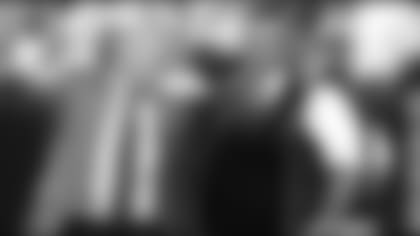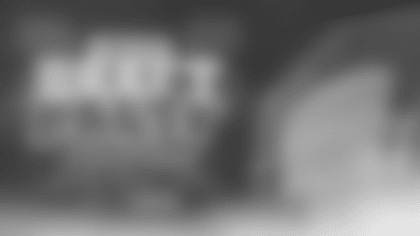Week 13: Bengals at Colts
Bill Polian, in his 11th season as Colts president, has a resume unique in the NFL. One of two men to win NFL Executive of the Year five times, Polian in the 1980s built the Buffalo Bills into a four-time Super Bowl participant. In the mid-1990s, he built the expansion Carolina Panthers into a team that made the NFC Championship Game in its second season, 1996. Since joining Indianapolis in 1998, he built the Colts from a 3-13 team in 1997 and 1998 into one that has made the playoffs eight of the last nine seasons, including an AFC Championship Game appearance after the 2003 and 2006 seasons, AFC South titles in 2003, 2004, 2005, 2006 and 2007 and a Super Bowl championship following the 2006 season. Each week during the season, in The Polian Corner, Polian and Colts.com will discuss issues pertinent to the Colts and the rest of the NFL.
Question: A 10-6 victory over the Cleveland Browns Sunday gave the Colts their first 5-0 record in a month since 1975. A remarkable month, particularly considering the circumstances and the competition.
A: It really was. New England, at Pittsburgh, Houston, at San Diego and at Cleveland – that's not a bad month's work. Pretty tough opposition and pretty tough schedule. The San Diego game was virtually a Monday Night game, so you were playing on a short week there and you had a short week after (a late October loss to) Tennessee getting ready for New England. By and large, a good job all the way around. Let's hope we can keep it going through the next four.
Q: The Browns seem to always play the Colts tough and games in Cleveland always seem to be low-scoring games. In retrospect, 10-6 might have been exactly what you would have expected on Sunday . . .
A: It's ironic because 9-6 was the final the previous time we went there (in 2003). We debated all week amongst ourselves, 'How would they play us?' It's obvious that they have more weapons than they had the last time we played them. They did not have Brady Quinn at quarterback (Sunday), but they have (wide receiver) Syndric Steptoe and the two wide receivers (Braylon Edwards and Dante Stallworth). They have the tight end (Kellen Winslow, Jr.) back and healthy, although he didn't finish the game. They have an offensive line that they think of as one of the best in football, so we said, 'Are they going to come out and throw it and try to wing it all around the ballpark and get in a shootout with us, or are they going to play us the way they wanted to play us the two previous times we've played them under (Head Coach) Romeo (Crennel)?' It was obvious from the first play that that's what they were going to do. They were going to play it close to the vest, drive the ball on the ground, hope to keep the ball away from us – we had only three possessions in the first half and one of those was a one-play-and-out because of the fumble – and hope that the turnovers would come in some form and that in the end they would be able to prevail in a tight ballgame. I was very proud of our guys – how tough they hung in there over the course of the ballgame, and how well they limited (Josh) Cribbs in the kicking game, which was critical. Had they gotten a break or two in the kicking game, that would have flipped field position and with the wind conditions, which were difficult, you'd have had a whole different kettle of fish. We were able to play that kind of game. It helps you to play in those kinds of games, because those kinds of grinders are what you're going to have in the playoffs if you are fortunate enough to get there. All in all, a good performance against a very tough team that executed the way they wanted to execute. In the end, our defense won it for us with some great plays and that's good for them, too. It's great for their morale to be able to do that.
Q: The Browns had 13 first downs, with 11 of them picked up on third down. That's ball control.
A: They were in 3rd-and-short all day, which is what they wanted to do. Of course, those 3rd-and-shorts are difficult to contain. When you only have two or three yards to go, it's difficult to stop them. So, they kept drives alive. We were able to hold them out of the end zone, fortunately. Our defense picked it up in the second half, clearly. In the first half, it was a little tougher, but in the second half, I think our defense really came to the fore and of course made the three big plays – the interception that iced the game; it was a great rush by (defensive end) Robert Mathis on that one, which caused the interception; then of course, the great rush by (defensive end) Dwight (Freeney) and Robert's return of the fumble (for a fourth-quarter touchdown); and Robert's sack, which put them in 2nd-and-20 and effectively took a huge step toward ending the game at that point.
Q: Mathis now has 51 career sacks. That's second all-time on the Colts behind Freeney, who has 67.
A: They should be. They're both great players.
Q: What makes Robert as good as he is? By NFL standards, he's undersized for a defensive end, yet he makes play after play after play . . .
A: He's a relentless, hard-charging, dedicated, supremely-talented professional. He has it all. The only thing that Robert Mathis doesn't do is talk. Everything else he does extremely well and I'm sure if he decided to become an analyst, he would be great at that, but he's a dedicated professional – among the best I ever have been around. I would put him right up there with (former Buffalo Bills) defensive end (and NFL all-time sacks leader) Bruce Smith, with (former Bills quarterback) Jim Kelly, with (former Bills running back) Thurman Thomas, with (former Bills wide receiver) Andre Reed, with the Hall of Famers or Hall of Famers to be that I've been fortunate enough to be associated with. Robert Mathis as a professional is in that class – as good as you'd want or you'd ever find. He's someone that everyone on the team looks up to. Even though he's very quiet and doesn't have much to say, he's a guy who everybody looks up to and everybody respects. He's an extraordinary human being.
Q: And Sunday was the first time he'd scored a touchdown – or even run with the ball – in his football career . . .
A: Maybe he was miscast his whole career. I think if I'd been a high school coach and had someone like him, I'd have put him at running back and run the same exact offense the Browns ran Sunday, except he'd probably carry it 50 times a game.
Q: The Colts' five victories in November came by a total of 20 points. That's postseason football . . .
A: It is. Those are grinder games. Every one of them has been that. The only one that was a shootout was the Texans game (a 33-27 Colts victory), and that one kind of out of hand late in the game. We've played really good football. We've played hard-nosed football. We've played close-to-the-vest football. We've played mistake-free football. Sunday was the first time we've had a fumble and an interception in the same game (this season). We have played awfully well. The only thing we didn't do Sunday was convert short-yardage and goal line. Had we done that, the game certainly would have been out of hand earlier than it was. But we didn't, and more power to them for preventing us from doing that. When you play those kind of grinder games, where both running backs have to contribute, where the offensive line has to block for the run against huge people, where you have to pass protect, where you have to execute on third down as we did numerous times on offense, where you have to stand up to the kind of onslaught the Browns brought with the running game – those kinds of games are the ones that are the deposits in the bank. You've been in those kinds of games before and when they come again, 'OK, I'm fine. I can handle this.' That's the way guys look at it.
Q: You think the young players know now it's a 60-minute game every week?
A: They surely do. Speaking of young players, hats off to (rookie center) Jamey Richard. He did a magnificent job against a very tough opponent (defensive tackle Shaun Rogers) and never gave an inch and never batted an eye. He just went out there and played and played well.
Q: The New England Patriots and Tampa Bay Buccaneers will play in London next season. Would the Colts give up a home game to play in that event?
A: We have no intention of giving up the home game. The reason the NFL plays in London is they believe it's important to export the game to Europe. The NBA is in Europe. Major League Baseball is in the Orient in a big way. We have been to Mexico City and Tokyo to play. The Mexico City was actually quite enjoyable; the Tokyo trip, less so. From what I've heard from people on the football side of things who have been to London, it is an ordeal. Of course, doing it in the regular season is very difficult. It's less so for New England, because they have the shortest trip of all, so it's probably not a major handicap. The NFL feels it's important to be there. Whether that turns out to be the right strategy remains to be seen. I have no opinion on it one way or the other. I was there with the Buffalo Bills many years ago. It was a very enjoyable trip, because it was a preseason game. But it was pretty clear the people in London knew very little or nothing about American football. That changed some with the advent of the Europe League when there was a team in London called the London Monarchs, which drew pretty well. But when the Europe League folded in its first incarnation, they did not go back to London and I'm not sure where the British sit right now with respect to our game. It's certain any reasonable person would tell you it's very far behind soccer, which is apparently their national sport. It's probably an uphill battle in terms of getting the NFL to be popular over there, but the league is giving it a try and you have to applaud them for that.
Q: What makes Tony Dungy one of the NFL's best head coaches? Is it his intelligence, his ability to motivate? What?
A: He is, at heart, an absolutely superb teacher. His mother and father were teachers. He inherited that gift, clearly. He's able to boil down the information in a very, very concise, very accurate, very applicable way. He gets it across to the players in an extremely intelligent, extremely adaptable way. He can stop a drill and correct an error with one sentence. He's excellent at it. The only person I've ever been around who is as good is (Hall of Fame Head Coach) Marv Levy. There's no secret why both of them have outstanding records. One is in the Hall of Fame and the other is sure to be as soon as he retires. That's their gift. You have to have great intelligence. You have to have great insight. You have to have great knowledge of the game in order to sift through all of the information, although I might add that for those of us who do this for a living and who have done it for a long time a lot the information that's out there is not terribly germane. We know that which is germane and that which isn't, and you can separate the wheat from the chaff rather easily. The bottom line, however, is when you get the information that's important you have to transmit it to the players in a way that they can accept and adapt and execute. Tony has an incredible gift for doing that in addition to which he's very inspirational. He gets his message across clearly and they hear him and believe in him. Beyond that, he's a person of extremely even temperament and that probably helps. It wears well over the long term. People like myself, who don't have that gift, it's little harder to take the ups and downs. He handles it quite well and his teams reflect that. We don't panic when things go wrong. We don't get terribly upset when things go wrong. When we get a bad bounce or a bad call, we bounce back from it. That's a trait that he has in abundance. Teams do reflect their head coach. Most often that's the case. Our team is certainly reflective of him both in the way we play and in our record.
Q: People like to talk about halftime adjustments. Are there a lot?
A: Not a lot, but there are some. He's great at it, and he's great directing the staff in going ahead and doing those things. There isn't a lot you need to do at halftime. You don't change the game plan. Never. You might emphasize a certain stunt against a certain blocking pattern. You might decide you're going to play a certain defense with a certain key on a certain down based on what they've done in the first half. Some of that is done on the sidelines between series. There will be times when you see him over there talking to the defense or in the defensive huddle. It's because he's found something that he thinks ought to be emphasized. But there's not a lot of it. You don't have enough time. You have about eight minutes when it's all said and done. There is no time for Knute Rockne-type speeches nor for installing new game plans, but the ability to analyze and be concise is very important there. And we always are a better second-half team than first-half team.
Q: Can you talk about the failed 4th-and-1 at the goal line late in the first half? Was the timing off between Peyton and Jamey Richard?
A: The timing between Peyton and Jamey was flawless and Jamey actually made a very good block on the play. The coaches call the play and there's no worry about his knee down there, because it had to be six inches to go – six-to-nine inches – and the bottom line is he pushed off his left foot and slipped. That's where the timing was fouled up. It was because of the slip. Had he not slipped, he was over the right-hand side, which was the right place to run it – he's over there and in. I saw the slip occur – we were seated right above the end zone – just as the ball was snapped and I said to the people next to me, 'Oh, he slipped. Dang it.' You could see it pretty clearly on television. It was one of those things. I think he maybe makes it otherwise. That's a decision Tony has to make: 'Do you take the points or do you go for the touchdown?' I can understand where Tony was coming from in that once we got ahead, that changed a little bit how they want to play offensively and we were hoping to get ahead, especially after all of the hard work we'd done to get up and down the field. As it turned out, our defense did a great job, stopped them and we had a chance maybe at a free kick at the end of the half. It's six of one, half a dozen of another. The timing was off, but that was because Peyton slipped with his left foot.
Q: Why was the fumble that Dallas Clark recovered in the end zone not a touchdown?
A: The issue is the Ken Stabler rule. Many, many years ago, (then-Oakland Raiders quarterback) Ken Stabler in the fourth quarter of a game (against San Diego) in a two-minute drive went back to throw and was about to be sacked. He rolled the ball on the ground forward like a bowling ball. It was recovered by (tight end) Dave Casper for a touchdown and the Raiders won the game. They put in a rule, the Ken Stabler rule, that says when the quarterback fumbles on fourth down only he may recover the ball. Any other player recovering the ball is null and void and the down is over. That's what occurred on that particular play. The ball goes back to the spot of the fumble.
Q: The Colts forced a punt on the ensuing series with less than 10 seconds remaining in the half. Had Keiwan Ratliff called for a fair catch, what could have happened next?
A: My understanding is Ratliff was instructed to fair catch. Now, sometimes – especially in those kinds of wind conditions – you can have a brain camp, especially if you're not terribly conversant with the rule and most players are not. Almost all football people are. (Colts Owner and Chief Executive Officer) Jim Irsay certainly was, as was I, as was Tony because he instructed him to fair catch the ball. If you fair catch in that situation, when you fair catch a punt, you have the opportunity for a free kick, which would have been approximately a 60-yard field goal with the wind behind us. Now, that attempt is returnable. You have to remember that if you miss, the other team can return it. We had that situation occur against the New York Jets in the very same situation. It was here in the dome some years ago – eight, nine years ago. The Jets returned it for a touchdown because we weren't on top of the details, as Tony is always reminding the players to be. We did not tackle the returner. In this particular case, had he fair caught the ball, we were prepared to try a field goal. It probably would have been in the 60-to-61-yard range, but with the wind behind you, there might have been a shot.
Q: What about the Colts' offense? Do you see predictability being a problem? Do the Colts need to change things up? Peyton Manning's statistics are down this year from past year, so could that be a sign that teams have caught up to what the Colts are doing?
A: My opinion is you don't need to change things up, that we're not predictable. We run an offense that's very sound, very solid, that can do any number of things. We do them all pretty well. The numbers mean absolutely nothing. The quarterback rating is meaningless except as an evaluator in some cases of relativity at the quarterback position. I'm not even sure it is that. Peyton (once) had a day where he was 19 of 21, threw for 225 yards and three touchdowns. His passer rating was in the low 90s or upper 80s. That's absurd. That's a perfect day. No interceptions, no turnovers. Impossible to have a better game than he had and I think his passer rating was in the mid-80s. The year we won the Super Bowl, you know who the lowest-rated quarterback was during the playoffs? Peyton Manning, so those numbers don't mean anything. The numbers that count are Ws and Ls. Now, in the offseason, we look at everything. We look at the efficacy of every play. We look at the efficacy of every formation. We look at what people are doing against us defensively. We talk a lot about it. We have statistics that measure that which we believe is important, and we do everything we can to tweak and update and keep the offense very, very current given the personnel we have. But the most important thing you do offensively is a) be sound, so that you don't turn the ball over, and b) run the ball effectively – that does not mean run it for 250 yards a game; it means run it effectively so people don't know whether you're going to run it or pass it, and when you do pass it, be effective and do not turn the ball over. We do all of those things and have done them well. The bottom line is this is an offense that functions very, very well and will continue to do that.
Q: Kicker Adam Vinatieri has had an outstanding year, it seems . . .
A: His kickoffs have been outstanding. They really are out of this world. For a guy who is as advanced in age – he'll hit me in the head with something during the week for saying that – but for a fellow who has been around as long as Adam has, to kick off the way he has is absolutely exceptional. He is doing a great job of it.
Q: Up next for the Colts are the Cincinnati Bengals. They're 1-10-1, but despite their record, they're a talented team, are they not?
A: Boy oh, boy – I'm telling you. This is a group that has talent all over the place. (Wide receiver Chad) Ocho Cinco; (wide receiver T.J.) Houshmandzadeh, who's having a great year; Cedric Benson, who solved their running back problems. They did have problems at running back; he solved them. He has been very reliable and steady for them. They have a gigantic offensive line that just manhandles you in the running game. I saw some clips of them against the (defending Super Bowl champion New York) Giants. They were knocking the Giants' defensive line all over the place. (Ryan) Fitzpatrick is a very steady quarterback. I remember scouting him at Harvard and coming away mightily impressed and in addition to being very steady, he has great escape ability. He is a very good athlete. He can run and throw on the run. Defensively, (defensive tackle) Domata Peko is every bit as much of a load as the guy we played last week (Cleveland nose tackle Shaun Rogers). And he's an active guy. He isn't just a guy who stays in one spot. He pursues and he can knock you backward. I don't know what he weighs – 320, 330, 340 – take a guess. They have good linebackers. The secondary has had some problems, but this is a club that is well-coached. (Head Coach) Marvin Lewis is certainly one of the great defensive coaches in this era of the game. It's puzzling to me why they have this kind of record, but any time you have this kind of talent, you have to be very, very careful. These guys can ignite and they can put 35 on you in a heartbeat with the kind of talent that they have. This is a tough, tough ballgame – not unlike what we faced in Cleveland.
Q: San Diego and Cleveland played with their backs to the wall the last two weeks. Cincinnati officially has been eliminated from the playoffs, but the Bengals now can play a spoiler role.
A: Not only that, they're playing for their jobs, because I would be very surprised if Marvin isn't back there as the coach. I would be very surprised if (Bengals Owner/President) Mike Brown and Marvin together are not going to look at that roster and say, 'OK, these are guys we can count on. These are guys who are going to be with us and who are going to be able to weather the storm when things go wrong. And these are fellows we would rather not have on the team, because they don't measure up in those kinds of circumstances,' so if a player wants to be retained and wants to keep his career going, he has to really perform. Those kinds of teams are the most dangerous kind, because they're playing for their jobs – not a playoff spot or something like that. They're playing for their careers. This is talent that can go off like a skyrocket at a moment's notice. You don't want to go out there and have to guard Ocho Cinco and Houshmandzadeh. That's a formidable duo in and of itself and Benson can run the ball far more effectively than anybody they've had in the last three or four years. This is a tough ballclub and not a walkover by any means. I would expect a very tough ballgame from them.
Q: What makes Houshmandzadeh an elite receiver?
A: He has really good route discipline. He runs every route the same way, and then he'll give you a little stick and a break and get loose. It's hard to tell what route he's running until he's into his breaks. He builds natural separation that way. Secondly, he has marvelous hands. He catches the ball exceptionally well. Third, he's a very tough guy. He will go over the middle and do that dirty work more than willingly. Fourth, he's very good after the catch. He's tough to bring down. He's a long guy. He likes to run after the catch. If you just hit him an average lick, the likelihood is he's not going down. He'll get yardage after the catch and that's reflected in his yardage statistics this year. He's an all-purpose receiver. People have developed this No. 1, No. 2 receiver thing like No. 1, No. 2 starters in baseball. I don't see it that way. I know they are complementary receivers. If you play opposite a guy like (Colts wide receiver) Marvin (Harrison), for example, you're not going to get as many balls, probably, but if you play as well as (wide receiver) Reggie (Wayne) does, it takes a while to make the Pro Bowl, but you become a complementary receiver. You're not a No. 2. You're a guy who contributes as much as the guy who gets more notoriety. Houshmandzadeh is exactly that. He's a Pro Bowl type of receiver. I'm sure his on-field stuff has been valued by football people for quite a while. On ESPN and other media outlets, Ocho Cinco provides good copy, but I'm not so sure that Houshmandzadeh over time hasn't been every bit as good a player.
Q: Has Ocho Cinco's talent diminished at all?
A: No. There's no diminishment in his talent. He's a guy that I have always found to have a really good sense of humor. He's an amusing guy. There are other people who get under your skin. He's creative and he's fun. Personally, I think he's kind of fun for the game and certainly supremely talented. He's a guy who gives you good effort every play. He can make the big play. He can do everything you want a receiver to do and also has world-class speed. They're a tough outfit to have to play against.














